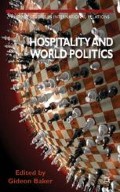Abstract
Thomas Hobbes starts his most famous political work, Leviathan, with a dedication to his friend, Francis Godolphin, in honour and gratitude to the memory of Francis Godolphin’s brother, Sidney Godolphin. Hobbes admires Sidney Godolphin as an exemplary citizen:
For there is not any vertue that disposeth a man, either to the service of God, or the service of his Country, to Civill Society, or private Friendship, that did not manifestly appear in his conversation, not as acquired by necessity, or affected by occasion, but inhaerent, and shining in a generous constitution of his nature.1
Access this chapter
Tax calculation will be finalised at checkout
Purchases are for personal use only
Preview
Unable to display preview. Download preview PDF.
Notes
Thomas Hobbes, Leviathan, C.B. Macpherson (ed.) (Middlesex, NJ: Penguin Books, [1651] 1968), p. 75.
The ‘Desires, and other Passions of man, are in themselves no Sin’. Ibid., p. 187. Indeed, it is so true that there is no’ such thing as... simply good’ that ‘even the goodness of which we ascribe to God Almighty, is his goodness to us’ (Hobbes, Human Nature, in Thomas Hobbes, The Elements of Law: Human Nature and De Corpore Politico, J.C.A. Gaskin (ed.) (Oxford: Oxford University Press, [1640, 1650] 1994), VIII, 3.)
See Macpherson’s critique of Hobbes as the origin of ‘bourgeois equality’ (Ibid., p. 51). On this point, see also Leo Strauss, The Political Philosophy of Hobbes, Its Basis and Its Genesis (Chicago, IL: University of Chicago Press, 1953).
Hobbes, Human Nature, in Thomas Hobbes, The Elements of Law: Human Nature and De Corpore Politico, J.C.A. Gaskin (ed.) (Oxford: Oxford University Press, 1994).
This discussion draws on Haig Patapan and Jeffrey Sikkenga, ‘Love and the Leviathan: Thomas Hobbes’ Critique of Platonic Eros’, Political Theory: An International Journal of Political Philosophy 36:6 (2008), pp. 803–26.
On the problem of glory, see generally Strauss, The Political Philosophy of Hobbes; Gabriella Slomp, Thomas Hobbes and the Political Philosophy of Glory (Houndmills: Macmillan Press Ltd., 2000)
Peter Caws (ed.), The Causes of Quarrel — Essays on Peace, War and Thomas Hobbes (Boston, MA: Beacon Press, 1989).
Deceptively simple because in reducing the Law of Nations to Hobbesian Law of Nature he implicitly repudiates stoic notions of ius gentium: see Thomas Pangle and Peter J. Ahrensdorf, Justice Among Nations: On the Moral Basis of Power and Peace (Kansas: University Press of Kansas, 1999), pp. 144–53.
For the influence of Hobbes on modern realists, such as Morgenthau, Niebhur, Carr, Butterfield, Osgood, Kerman, Beitz and Kissinger, see C. Navari, ‘Hobbes, the State of Nature and the Laws of Nature’, in Ian Clark and Iver Neumann (eds.), Classical Theories of International Relations (Houndmills: Macmillan Press, 1996)
H. Williams, International Relations in Political Theory (Milton Keynes: Open University Press, 1992)
M. Smith, Realist Thought from Weber to Kissinger (Baton Rouge: Louisiana State University Press, 1986).
It became the basis of the so-called English school of international relations: see Hedley Bull, ‘Hobbes and International Anarchy’, Social Research 41 (1977), pp. 717–38
Claire Cutler, ‘The Grotian Tradition in International Relations’, Review of International Studies 17 (1991), pp. 41–65
Martin Wight, International Relations: Three Traditions (London: Holmes and Meier, 1992)
I draw on Laurie Johnson, Thucydides, Hobbes, and the Interpretation of Realism (Northern Illinois: DeKalb, 1993), pp. 87–94.
Donald W. Hanson, ‘Thomas Hobbes’s ‘Highway to Peace’, International Organization Spring 38:2 (1984), pp. 329–54
Francis Cheneval, ‘The Hobbesian case for Multilateralism’, Swiss Political Science Review 13:3 (2007), pp. 309–35.
Editor information
Editors and Affiliations
Copyright information
© 2013 Haig Patapan
About this chapter
Cite this chapter
Patapan, H. (2013). Leviathan’s Children: On the Origins of Modern Hospitality. In: Baker, G. (eds) Hospitality and World Politics. Palgrave Studies in International Relations Series. Palgrave Macmillan, London. https://doi.org/10.1057/9781137290007_2
Download citation
DOI: https://doi.org/10.1057/9781137290007_2
Publisher Name: Palgrave Macmillan, London
Print ISBN: 978-1-349-45035-0
Online ISBN: 978-1-137-29000-7
eBook Packages: Palgrave Political & Intern. Studies CollectionPolitical Science and International Studies (R0)

